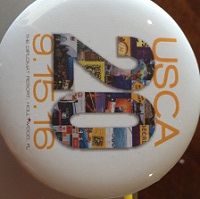Article
Protesters Take Stage at AIDS Conference
Author(s):
AIDS activists have not lost their zeal for protest. At a pharma-sponsored luncheon, a band of activists criticizing the price of antivirals brought things to a brief halt.

Things got rowdy today at the United States Conference on AIDS.
Interrupting a Gilead-sponsored two-hour lunch, lecture, and entertainment program, a contingent of protesters took center stage. Their grievance: the company’s high prices for the pharmaceuticals that can prevent HIV infection and cure hepatitis.
Earlier in the day, another group of conference attendees held a Black Lives Matter rally that drowned out speakers at nearby seminars. Their demand was for better access to health care for all.
At the luncheon, the theme was “convergence” a term meant to convey that with new drugs there is no disconnect between preventing HIV infection and treating it. It’s just a matter of getting people into treatment and giving them care and the correct prescriptions, the reasoning goes.
But before the show started, a group of protesters with a handheld siren took the stage and started shouting negative things about the about the very people paying for the program--along with the free chicken-and-rice meal everyone was eating.
“Don’t depend on their blood money,” one of the protestors shouted, “We need government to step up and fund this--Fight pharma, ACTUp, fight back.”
The disruption put host Paul Kawata, executive director of the National Minority Aids Council, in a difficult spot.
There he was on the stage, joking and getting ready to introduce a program of entertainers, scientists, and advocates, when everything came to a halt.
He let them have their say, noting that protest "Is in the DNA of our movement."
Then, Kawata had to abandon much of his prepared speech.
“Don’t you just love my job, don’t you just wish you had it?” he said.
“It’s very difficult to be partners with industry,” he said, “They are our friends and our enemies; they have a choice on how they work with us as we have a choice.”
But, he added “I am too old not to say the truth . . . I’ve got an epidemic to end and I have to build a partnership because the lives of people of color are more important to me than any of my personal feelings.”
Kawata said he is not a scientist, and he can’t invent drugs, but that pharma can and has.
“We have to live in a real world figure out how to fight together,” even though there will be disagreements on tactics. “Thank you Gilead for giving us this gift, “ he concluded, “I am grateful.”
The show then went on, featuring American Idol finalist Todrick Hall and a dance group, (photo) as well as presentations by Richard Elion, MD, a George Washington University AIDS specialist, blogger-activist Ken Williams and political commentator Melissa Harris-Perry, PhD.
The audience finished their chicken.
It was not the last word from the protestors, who leafleted the exiting crowd with what they said were fact sheets on “Kilead” and its drug prices. And Harris-Perry said the social issues that have helped put minorities at the greatest risk of contracting HIV aren't easily fixed.
"Drugs won't solve this," she said.




